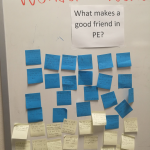Last year we played the Hokey Pokey on a district scale. We took the kids out. We put the kids in. We took half the kids out and put the other half in. There was absolutely no consistency to the 2020-21 school year, and plans and policy were expected to (and did) change roughly every six weeks. This lack of consistency put immense pressure on students, teachers, and administrators and, quite frankly, I am extremely proud of how well all of us were able to do our jobs under the circumstances.
This failing was not necessarily the fault of any one group, but the collective need for and demand of satisfaction. The school board and administration were caught between strong and increasingly vocal contingents to reopen schools at any cost, and those who had criteria for a return to in-person learning.
What I witnessed, essentially, was a struggle between feeling and reason. On the one hand were those who felt that students needed to physically be in school in order to learn, regardless of any other concerns. On the other were those who wanted to wait until a return to in-person learning was recommended; who understood that yes, learning in a classroom is most effective, but of more immediate concern is the community’s health and safety.
My school district did its best to satisfy both of these parties, but therein lies the problem. Polls were sent out to parents, students, educators and admin to assess the comfort levels and viability of a broad spectrum of educational options. They offered dedicated full-time at-home online learning. They made plans, and contingencies, then when circumstances changed and rendered both the plans and contingencies moot, new ones were drafted. At every stage there was transparency, openness, and a desire for discourse and critique.
All of this is useless, however, when those with whom you’re being transparent, open, and encouraging of dialogue completely deny any interpretation other than their own
So far this year, our school has had the policy of isolating students who have had prolonged exposure within three feet of any student who has tested positive. Typically this means any student who sat adjacent to the positive case. While this all may seem straightforward, parents have become increasingly upset over the course of the past few weeks — even going so far as to demand that a tape measure be used to see if their student were indeed within 3 feet of the student who tested positive. This is not necessarily problematic; what is problematic is that administration is indulging these demands.
Again, none of this is the fault of any given person, group, or ideology; but rather the attempt to placate all of these people, groups, and ideologies that has caused the most damage to schools.
Schools are under intense scrutiny. Every judgment and action is critiqued incessantly. Instead of playing into these conversations, I think schools would be better served starting the conversation; to be proactive, rather than reactive to stakeholders who, quite frankly, have little to no knowledge of how schools operate.
As of this writing I was just informed that roughly 15% of our student body is out due to positive tests. 15% in three weeks. What conversation could be started to account for that?









Comments 2
We went from 16 cases last week to 36 this week. It’s terrifying. I’m glad to hear your district was transparent last year. It seemed all our decisions were made in a vacuum without teacher support and this year has started off no differently.
There needs to be a line in the sand somewhere that says, “We will take it from here.” When we go to the airport, you don’t go through security unless you have a boarding pass. Everyone knows and accepts that. There are exceptions: if you fall under specific criteria you can get a gate pass to accompany a passenger through security. At some point though, you must say goodbye and let the passenger get on the plane. Schools and districts need to clearly define where that line is located.